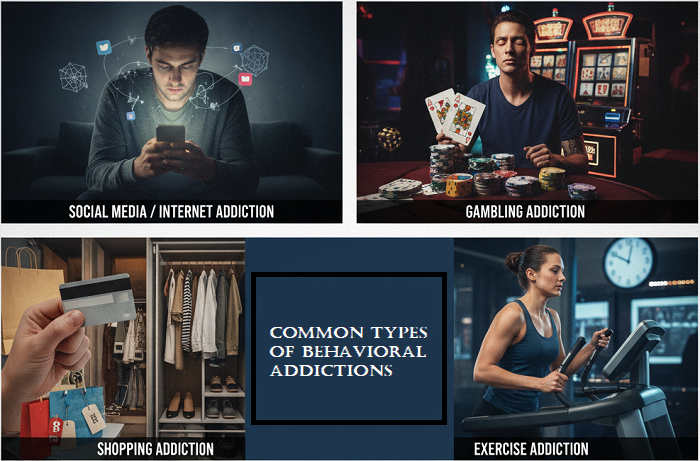Drugs or alcohol are not always the factors of addiction. Behavioral addiction is a strong tendency that makes people develop a desire to do some things even when such actions are detrimental. At Palm Coast Treatment Solutions, we know that such behaviors are as disruptive as substance addictions.
Clients would be able to have control, balance, and joy once more through sound and meaningful living through our evidence-based behavioral addiction treatment programs.
What is Behavioral Addiction Treatment?
The treatment of behavioral addiction is aimed at treating compulsions that stimulate the reward system of the brain, as substances do. People usually feel in a hurry or relieved of emotions when performing the act, and then they feel guilty, anxious, or out of control.
Cognitive Behavior Therapy (CBT), Dialectical Behavior Therapy (DBT), and Motivational Interviewing (MI) are some of the therapies that are integrated into a holistic treatment approach at Palm Coast Treatment Solutions to identify and address the underlying causes of addiction (emotional and psychological). We are in an emotional, caring space that gives us the necessary support in order to substitute the bad habits with positive, life-affirming decisions.

Common Types of Behavioral Addictions
The behavioral addictions may be in various forms, such as:
- Gambling Addiction: Continuous betting despite adverse effects.
- Internet or Gaming Addiction: Too much time spent attending to the Internet or playing games.
- Shopping Addiction: Uncontrollable spending that causes financial stress.
- Sex or Pornography Addiction: Constant obsession with sexual material or action.
- Food Addiction: The over eating or being obsessed with certain foods.
- Exercise Addiction: Obsessive reliance on exercise to cope with emotions.
Causes of Behavioral Addiction
Behavioral addictions are usually caused by a complex of biological, psychological, and social issues such as:
Genetic predisposition
Addiction may be a risk factor in a family history.
Mental issues
Mental issues such as depression, anxiety, or trauma can be a contributing factor.
Environmental factors
Loneliness, stress, or peer pressure may initiate addictive behaviors.
Brain chemistry
Neurotransmitters such as dopamine strengthen reward-seeking behavior.
Signs and Symptoms of Behavioral Addiction
The initial step in the process of recovery is the identification of the symptoms. Common signs include:
- Incurring unnecessary time on the activity, even at the expense of responsibilities.
- Experience anxiety, irritation, or restlessness when it is not possible to perform the behavior.
- Secrecy or hiding of the activity from the people you love.
- Suffer emotionally, financially, or even relationship-wise as a result of the action.
- Having to have more or more of the same degree or frequency to be satisfied.
When all these symptoms ring true, then professional behavioral addiction therapy can assist you or your loved one to regain control and lead a stable life.
Behavioral Addiction Support and Recovery
Therapy sessions and support groups give a feeling of belonging and accountability, which is critical for sustained recovery.
Palm Coast Treatment Solutions possesses a multidisciplinary group of people that offers:
- Evidence-based therapies
- Group and family counseling
- The prevention of relapse planning.
- Individualized recovery interventions.
We enable the clients to develop self-awareness, enhance emotional control, and lead happy, addiction-free lives.

Take the First Step Toward Healing
Behavioral addiction is not a thing you have to deal with on your own. Gambling, use of technology, or any other compulsive desire, Palm Coast Treatment Solutions can help you overcome it long-term and help you be cured.
Call (386) 284-4151 now to speak with an understanding admissions officer or visit our facility in Palm Coast, FL, to learn how we can help you or a loved one embark on a wellness journey.
Frequently Asked Questions
1. What is the best treatment for behavioral addiction?
CBT, group counseling, and holistic support are most effective in treating this disorder by identifying triggers and developing health-promoting coping strategies.
2. How can I break a behavioral addiction?
Begin by admitting that there is a problem and enlisting the help of a professional and creating an enabling atmosphere. The progress depends on the structured therapy and regular practice.
3. Can behavioral addictions be cured?
Although behavioral addictions are not a permanent threat, they can be controlled. Ongoing therapy and support help many to maintain their lifelong recovery.
4. How can I help someone struggling with behavioral addiction?
Be understanding, promote professional treatment, and jbe udgmental. It is essential to encourage change by means of family therapy and open communication.
5. What are the 4 C’s of addiction?
The 4 Cs of Craving, Compulsion, Control loss and Consequences characterize addiction and indicate how behavior continues to persist despite adverse effects.
6. What are the main treatment approaches?
The five most popular approaches are CBT, DBT, MI, group therapy, and family therapy, each of which will make clients learn about triggers and develop healthier behaviors.












